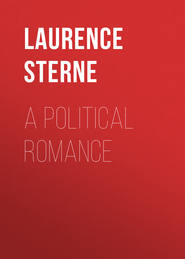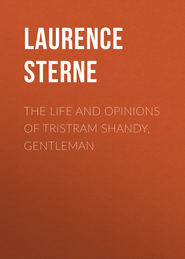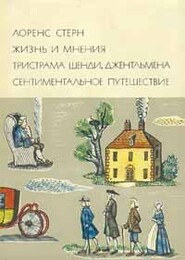По всем вопросам обращайтесь на: info@litportal.ru
(©) 2003-2025.
✖
A Sentimental Journey Through France and Italy
Настройки чтения
Размер шрифта
Высота строк
Поля
CALAIS
The good old monk was within six paces of us, as the idea of him crossed my mind; and was advancing towards us a little out of the line, as if uncertain whether he should break in upon us or no.—He stopp’d, however, as soon as he came up to us, with a world of frankness: and having a horn snuff box in his hand, he presented it open to me.—You shall taste mine—said I, pulling out my box (which was a small tortoise one) and putting it into his hand.—’Tis most excellent, said the monk. Then do me the favour, I replied, to accept of the box and all, and when you take a pinch out of it, sometimes recollect it was the peace offering of a man who once used you unkindly, but not from his heart.
The poor monk blush’d as red as scarlet. Mon Dieu! said he, pressing his hands together—you never used me unkindly.—I should think, said the lady, he is not likely. I blush’d in my turn; but from what movements, I leave to the few who feel, to analyze.—Excuse me, Madame, replied I,—I treated him most unkindly; and from no provocations.—’Tis impossible, said the lady.—My God! cried the monk, with a warmth of asseveration which seem’d not to belong to him—the fault was in me, and in the indiscretion of my zeal.—The lady opposed it, and I joined with her in maintaining it was impossible, that a spirit so regulated as his, could give offence to any.
I knew not that contention could be rendered so sweet and pleasurable a thing to the nerves as I then felt it.—We remained silent, without any sensation of that foolish pain which takes place, when, in such a circle, you look for ten minutes in one another’s faces without saying a word. Whilst this lasted, the monk rubbed his horn box upon the sleeve of his tunic; and as soon as it had acquired a little air of brightness by the friction—he made me a low bow, and said, ’twas too late to say whether it was the weakness or goodness of our tempers which had involved us in this contest—but be it as it would,—he begg’d we might exchange boxes.—In saying this, he presented his to me with one hand, as he took mine from me in the other, and having kissed it,—with a stream of good nature in his eyes, he put it into his bosom,—and took his leave.
I guard this box, as I would the instrumental parts of my religion, to help my mind on to something better: in truth, I seldom go abroad without it; and oft and many a time have I called up by it the courteous spirit of its owner to regulate my own, in the justlings of the world: they had found full employment for his, as I learnt from his story, till about the forty-fifth year of his age, when upon some military services ill requited, and meeting at the same time with a disappointment in the tenderest of passions, he abandoned the sword and the sex together, and took sanctuary not so much in his convent as in himself.
I feel a damp upon my spirits, as I am going to add, that in my last return through Calais, upon enquiring after Father Lorenzo, I heard he had been dead near three months, and was buried, not in his convent, but, according to his desire, in a little cemetery belonging to it, about two leagues off: I had a strong desire to see where they had laid him,—when, upon pulling out his little horn box, as I sat by his grave, and plucking up a nettle or two at the head of it, which had no business to grow there, they all struck together so forcibly upon my affections, that I burst into a flood of tears:—but I am as weak as a woman; and I beg the world not to smile, but to pity me.
THE REMISE DOOR
CALAIS
I had never quitted the lady’s hand all this time, and had held it so long, that it would have been indecent to have let it go, without first pressing it to my lips: the blood and spirits, which had suffered a revulsion from her, crowded back to her as I did it.
Now the two travellers, who had spoke to me in the coach-yard, happening at that crisis to be passing by, and observing our communications, naturally took it into their heads that we must be man and wife at least; so, stopping as soon as they came up to the door of the Remise, the one of them who was the Inquisitive Traveller, ask’d us, if we set out for Paris the next morning?—I could only answer for myself, I said; and the lady added, she was for Amiens.—We dined there yesterday, said the Simple Traveller.—You go directly through the town, added the other, in your road to Paris. I was going to return a thousand thanks for the intelligence, that Amiens was in the road to Paris, but, upon pulling out my poor monk’s little horn box to take a pinch of snuff, I made them a quiet bow, and wishing them a good passage to Dover.—They left us alone.—
–Now where would be the harm, said I to myself, if I were to beg of this distressed lady to accept of half of my chaise?—and what mighty mischief could ensue?
Every dirty passion, and bad propensity in my nature took the alarm, as I stated the proposition.—It will oblige you to have a third horse, said Avarice, which will put twenty livres out of your pocket;—You know not what she is, said Caution;—or what scrapes the affair may draw you into, whisper’d Cowardice.—
Depend upon it, Yorick! said Discretion, ’twill be said you went off with a mistress, and came by assignation to Calais for that purpose;—
–You can never after, cried Hypocrisy aloud, show your face in the world;—or rise, quoth Meanness, in the church;—or be any thing in it, said Pride, but a lousy prebendary.
But ’tis a civil thing, said I;—and as I generally act from the first impulse, and therefore seldom listen to these cabals, which serve no purpose, that I know of, but to encompass the heart with adamant—I turned instantly about to the lady.—
–But she had glided off unperceived, as the cause was pleading, and had made ten or a dozen paces down the street, by the time I had made the determination; so I set off after her with a long stride, to make her the proposal, with the best address I was master of: but observing she walk’d with her cheek half resting upon the palm of her hand,—with the slow short-measur’d step of thoughtfulness,—and with her eyes, as she went step by step, fixed upon the ground, it struck me she was trying the same cause herself.—God help her! said I, she has some mother-in-law, or tartufish aunt, or nonsensical old woman, to consult upon the occasion, as well as myself: so not caring to interrupt the process, and deeming it more gallant to take her at discretion than by surprise, I faced about and took a short turn or two before the door of the Remise, whilst she walk’d musing on one side.
IN THE STREET
CALAIS
Having, on the first sight of the lady, settled the affair in my fancy “that she was of the better order of beings;”—and then laid it down as a second axiom, as indisputable as the first, that she was a widow, and wore a character of distress,—I went no further; I got ground enough for the situation which pleased me;—and had she remained close beside my elbow till midnight, I should have held true to my system, and considered her only under that general idea.
She had scarce got twenty paces distant from me, ere something within me called out for a more particular enquiry;—it brought on the idea of a further separation:—I might possibly never see her more:—The heart is for saving what it can; and I wanted the traces through which my wishes might find their way to her, in case I should never rejoin her myself; in a word, I wished to know her name,—her family’s—her condition; and as I knew the place to which she was going, I wanted to know from whence she came: but there was no coming at all this intelligence; a hundred little delicacies stood in the way. I form’d a score different plans.—There was no such thing as a man’s asking her directly;—the thing was impossible.
A little French débonnaire captain, who came dancing down the street, showed me it was the easiest thing in the world: for, popping in betwixt us, just as the lady was returning back to the door of the Remise, he introduced himself to my acquaintance, and before he had well got announced, begg’d I would do him the honour to present him to the lady.—I had not been presented myself;—so turning about to her, he did it just as well, by asking her if she had come from Paris? No: she was going that route, she said.—Vous n’êtes pas de Londres?—She was not, she replied.—Then Madame must have come through Flanders.—Apparemment vous êtes Flammande? said the French captain.—The lady answered, she was.—Peut être de Lisle? added he.—She said, she was not of Lisle.—Nor Arras?—nor Cambray?—nor Ghent?—nor Brussels?—She answered, she was of Brussels.
He had had the honour, he said, to be at the bombardment of it last war;—that it was finely situated, pour cela,—and full of noblesse when the Imperialists were driven out by the French (the lady made a slight courtesy)—so giving her an account of the affair, and of the share he had had in it,—he begg’d the honour to know her name,—so made his bow.
–Et Madame a son Mari?—said he, looking back when he had made two steps,—and, without staying for an answer—danced down the street.
Had I served seven years apprenticeship to good breeding, I could not have done as much.
THE REMISE
CALAIS
As the little French captain left us, Mons. Dessein came up with the key of the Remise in his hand, and forthwith let us into his magazine of chaises.
The first object which caught my eye, as Mons. Dessein open’d the door of the Remise, was another old tatter’d désobligeant; and notwithstanding it was the exact picture of that which had hit my fancy so much in the coach-yard but an hour before,—the very sight of it stirr’d up a disagreeable sensation within me now; and I thought ’twas a churlish beast into whose heart the idea could first enter, to construct such a machine; nor had I much more charity for the man who could think of using it.
I observed the lady was as little taken with it as myself: so Mons. Dessein led us on to a couple of chaises which stood abreast, telling us, as he recommended them, that they had been purchased by my lord A. and B. to go the grand tour, but had gone no further than Paris, so were in all respects as good as new.—They were too good;—so I pass’d on to a third, which stood behind, and forthwith begun to chaffer for the price.—But ’twill scarce hold two, said I, opening the door and getting in.—Have the goodness, Madame, said Mons. Dessein, offering his arm, to step in.—The lady hesitated half a second, and stepped in; and the waiter that moment beckoning to speak to Mon. Dessein, he shut the door of the chaise upon us, and left us.
THE REMISE
CALAIS
C’estbien comique, ’tis very droll, said the lady, smiling, from the reflection that this was the second time we had been left together by a parcel of nonsensical contingencies,—c’est bien comique, said she.—
–There wants nothing, said I, to make it so but the comic use which the gallantry of a Frenchman would put it to,—to make love the first moment, and an offer of his person the second.
’Tis their fort, replied the lady.
It is supposed so at least;—and how it has come to pass, continued I, I know not; but they have certainly got the credit of understanding more of love, and making it better than any other nation upon earth; but, for my own part, I think them arrant bunglers, and in truth the worst set of marksmen that ever tried Cupid’s patience.
–To think of making love by sentiments!
I should as soon think of making a genteel suit of clothes out of remnants:—and to do it—pop—at first sight, by declaration—is submitting the offer, and themselves with it, to be sifted with all their pours and contres, by an unheated mind.
The lady attended as if she expected I should go on.
Consider then, Madame, continued I, laying my hand upon hers:—
That grave people hate love for the name’s sake;—
That selfish people hate it for their own;—
Hypocrites for heaven’s;—
And that all of us, both old and young, being ten times worse frightened than hurt by the very report,—what a want of knowledge in this branch of commence a man betrays, whoever lets the word come out of his lips, till an hour or two, at least, after the time that his silence upon it becomes tormenting. A course of small, quiet attentions, not so pointed as to alarm,—nor so vague as to be misunderstood—with now and then a look of kindness, and little or nothing said upon it,—leaves nature for your mistress, and she fashions it to her mind.—
Then I solemnly declare, said the lady, blushing, you have been making love to me all this while.
THE REMISE
CALAIS
Monsieur Dessein came back to let us out of the chaise, and acquaint the lady, the count de L—, her brother, was just arrived at the hotel. Though I had infinite good will for the lady, I cannot say that I rejoiced in my heart at the event—and could not help telling her so;—for it is fatal to a proposal, Madame, said I, that I was going to make to you—
–You need not tell me what the proposal was, said she, laying her hand upon both mine, as she interrupted me.—A man my good Sir, has seldom an offer of kindness to make to a woman, but she has a presentiment of it some moments before.—
Nature arms her with it, said I, for immediate preservation.—But I think, said she, looking in my face, I had no evil to apprehend,—and, to deal frankly with you, had determined to accept it.—If I had—(she stopped a moment)—I believe your good will would have drawn a story from me, which would have made pity the only dangerous thing in the journey.
In saying this, she suffered me to kiss her hand twice, and with a look of sensibility mixed with concern, she got out of the chaise,—and bid adieu.











